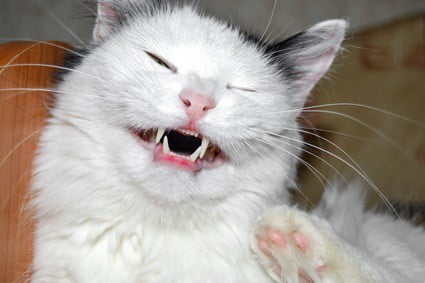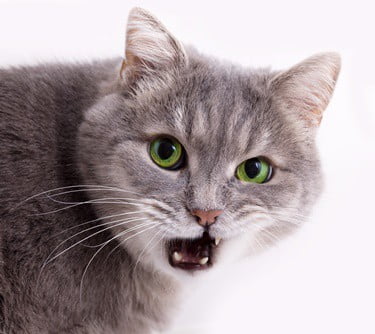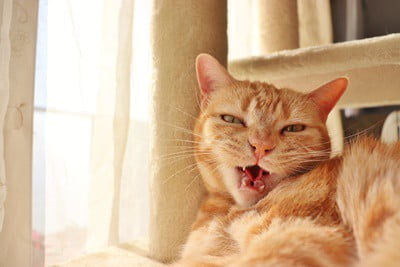Many owners notice their cats making weird faces. It may seem like a grin or baring fangs when the cat holds its mouth slightly open. Although unnerving to see first thing in the morning, it’s normal behavior for a cat. It’s rarely aggressive behavior unless you notice other signs of hostility accompanying it.
Cats most commonly hold their mouths open to smell pheromones. This is called the flehmen response. Cats have an organ on the roof of their mouths that allows them to analyze scents. To gain access to it, they need to open their mouths and promote airflow across the vomeronasal gland. This allows cats to detect nearby mates, kittens, food, and territories that belong to other cats.
However, there are cases where it indicates dental pain or health issues. Cats with inflamed gums or teeth will open their mouths to limit discomfort. Your cat may also have trouble breathing or a growth in its throat that prevents it from vocalizing. In these cases, you’ll have other clear symptoms that warn you about what’s happening.
Reasons Why A Cat Has Its Mouth Open
Cats navigate much of their world by scent; they have over 200 million sensors in their noses devoted to smell. To make their odor detection even more effective, cats also rely on the insides of their mouths.
Although dogs often let their mouths hang open as a matter of habit, cats mostly do so to get a fine-tuned reading on a smell. It may seem odd to find your cat perched with its teeth slightly bared and its mouth parted. However, your cat is doing an advanced form of sniffing the air.
On rare occasions, it will also mean your cat has dental pain or is experiencing trouble breathing. It may be attempting to verbalize, and if it’s upset, it may be preparing to bite. Let’s explore all the reasons:
Unique Scents
If your cat is holding its mouth open, especially if it’s male, then it’s most likely using the flehmen response. The word flehmen comes from a German verb that means “to bare the upper teeth or curl the lip.” As such, the flehmen response is when an animal opens its mouth to smell an interesting scent more precisely.
A cat taking the air in through its mouth can let it pass across an organ. This is called Jacobson’s organ or the vomeronasal gland, which can analyze the odor. This sense is a combination of taste and smell.
According to Ethology, cats primarily use the flehmen reaction when smelling sexual pheromones. Specifically, they detect any left in urine for marking territory or by a female cat in heat. Cats use pheromones to:
- Communicate certain messages with other cats
- Identify different cats
These pheromones most often come from urine or feces. Although all cats exhibit the flehmen response, male cats do it most often. They are more attuned to sex-related information, even if they are neutered. Let’s explore other ways cats can use the flehmen response to narrow down scents:
Urine for Marking Territory and/or Identification
Male cats use urine to mark their territory, especially if they are not neutered. In fact, this is one of the most common reasons why cat owners neuter their cats.
If you have multiple males in one household or other cats nearby, the unneutered cats will likely start urinating around the house. This is an attempt to mark their territory from the other cats.
Both male and female cats spray, however. That’s because cat urine has pheromones in it, which are unique identifiers that tell other cats their age, gender, and other factors.
Cats use the organ on the roof of their mouths to analyze these scents far better than their noses can. Once a cat has finished analyzing this scent, it can determine whose territory it’s walking on. Based on that information, it may feel welcomed there or threatened.
A Female in Heat
A male cat will also use the flehmen response when trying to locate a female to mate with. When in heat, a female releases pheromones as a signal for males in the area to draw near. She’s ready to breed, and they should know it. Therefore, if a male cat senses a mating signal in the air, he may use the flehmen response to:
- Get a better idea of who the signals belong to
- Understand where the female cat is located
This is an important ability for outdoor or feral cats. Otherwise, they may not be able to find a mate and procreate as easily. Once the female has gotten pregnant, she will stop releasing these pheromones. This only applies to cats that aren’t spayed, however. Spayed cats don’t release these mating signals since they can no longer be in heat.

A Mother and Her Kittens
After giving birth, mother cats use pheromones to identify their kittens. A mother will hold her mouth open to smell these pheromones and find where her kittens are after leaving them briefly to hunt. The mother also releases pheromones in her milk. This serves 2 purposes:
It will calm agitated kittens down. This is why some people will use a pheromone diffuser with anxious or agitated cats. The product sprays a chemical in the air that mimics the pheromones in a mother’s milk. It can help reduce stress in your cat due to any changes in the environment, making it feel the same calm that it experienced as a kitten. This will reduce scratching or spraying around the house.
Besides that, pheromones in a mother’s milk work as a guide, so the kittens can find each other and their mother. For example, a kitten may accidentally stray from the litter and get lost. By remembering the pheromones in its mother’s milk, it can follow that trail back to its hiding spot.
Food or Catnip
Cats obviously respond to the scent of food. If that meal is too far away or the cat isn’t sure about it, it will use the flehmen response. If it’s particularly enticed by the odor, it may even open its mouth to get a stronger whiff up-close to the food. This is usually the case with catnip.
Some cats can interpret the smell of catnip as feline pheromones. That’s why certain cats respond to the herb so intensely, be they male or female.
The response of your cat will depend on its personality and biology. Some cats are very affectionate, relaxed, and happy. Other cats will be playful or even aggressive. Some will avoid catnip altogether.
According to Behavioural Processes, only around 60% of adult cats actively respond to catnip. However, nearly 100% at least respond to it passively. For cats that have a positive reaction to catnip, it can help relieve anxiety and even pain.
Dental Pain
Of course, there are situations where your cat isn’t just smelling the air with its mouth. Sometimes, the cat is holding its mouth slightly open because of dental pain.
The action will stop the teeth from making contact, thereby limiting pain. It can also promote airflow over inflamed gums or wounds that need relief. The most common causes of mouth pain in cats are:
Gingivitis
Gingivitis is a common dental problem in many animals, including cats. It happens when there is a buildup of plaque on the teeth. If your cat has this problem, it’s important to treat it soon. Gingivitis can lead to periodontal disease, which can result in the loss of an affected tooth. Signs of gingivitis include:
- Inflamed gums (the gums will swell and appear red)
- Lethargy
- Pain while eating (your cat may only chew on one side of the mouth, meow while eating, or stop eating altogether)
- Bad breath (worse than normal)
Stomatitis
Cats may also experience mouth pain from stomatitis. It’s also known as feline stomatitis or feline chronic gingivostomatitis. The condition is described as chronic, painful inflammation of the gums or the back of the mouth. The cause isn’t exactly known, but it is linked to an autoimmune response. The signs of stomatitis are:
- Bright red gums that bleed easily
- Bad breath
- Drooling
- Excessive swallowing
- Pawing at their face
- Difficulty eating and/or grooming
There isn’t a cure for stomatitis. However, according to the Journal of the American Veterinary Medical Association, tooth extraction can be a useful fix for stomatitis in many cats. In this study, 39% of the subjects had substantial improvement, and 28.4% had a complete recovery from stomatitis.
This treatment isn’t effective for every cat. However, if your pet has stomatitis and experiences a great deal of pain, you can talk to your vet about tooth extraction. The professional may also recommend treatment options that are more custom-tuned to your pet.
Trouble Breathing
Your cat may hold its mouth open due to trouble breathing. Its nose could be blocked due to allergies, infection, or tumors in the nose. This leads to your cat needing to take in air through its mouth rather than its nose.
If this is the case, your cat will be very stressed. You will see it struggle to breathe, take deeper breaths, and appear frantic at times. In rare instances, your cat may have acute respiratory distress, commonly caused by:
- Heart disease
- Lung disease
- Feline Infectious Peritonitis (FIP)
- An injury to the cat’s chest
This condition may escalate, leading to your cat needing to be put on oxygen immediately. Check for these symptoms:
- Panting and trouble breathing
- Refusing to move
- Head lowered with its legs pulled away from the chest and body
- Coughing
- Bluish gums, which points to low levels of oxygen in the blood

Attempting To Verbalize
On a less scary note, cats that open their mouth just slightly could be preparing to vocalize. Although felines mainly rely on body language to express themselves, they also communicate vocally. This is done through:
- Meowing
- Hissing
- Purring
If your cat opens its mouth but doesn’t make a sound, it could be undecided. It’s thinking over what sound it will make and if it should make it. Cats are pretty decisive creatures, though, which explains why this is an uncommon habit for your cat.
However, the cat may also be hesitant because it can’t make a sound or can’t do so without difficulty. That will make the gesture a common one for your cat. It may be struggling with:
- A throat obstruction
- Swelling of the lymph nodes beneath the jaw
- Nerve damage to the larynx, called laryngeal paralysis
Preparing To Bite
Some cats hold their mouths open when they are preparing to bite. If you are petting your cat while this happens, it could be a warning you to stop; the cat isn’t having fun anymore. Look out for other signs of aggression, such as:
- Fidgeting
- Tensing
- Growling
- Hissing
This is a clear indicator that your feline is about to bite. You should give it space until it relaxes or calms down.
A cat holding its mouth open is normal. It’s likely smelling the air or beginning to speak. If it’s matched with symptoms of health issues, you should pay attention. Likewise, if the cat seems agitated, consider giving it space until later.


I have an adult male orange tabby, he’s 8 years old. The last few days I have noticed him falling asleep with his mouth slightly open, And I mean very slightly, I can just see his spots on his lips… He does usually close his mouth once he goes all the way to sleep… so I’m hoping it’s just because he’s super relaxed, but I know he has allergy issues so I’m hoping that’s all it is.. how do I know when I need to take him in to be seen..?